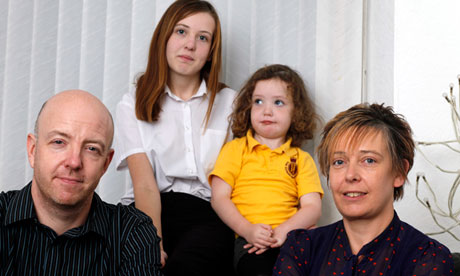
Karen and Darren Millar live in Mansfield, Nottinghamshire. They both work full-time, Karen as a family support worker and Darren as a computer programmer. They rent privately and have four children, aged between three and 16. Their gross family income is £44,000, including tax credits. Karen said:
"People might think that four children is asking for trouble but we coped perfectly well until the coalition came in and began cutting away at the tax credit system at the same time as childcare costs increased. We used to get half of our childcare costs paid but now we get nothing because we earn over £40,000. We're just above the threshold but not enough to pay for all our childcare ourselves without devastating results. Childcare takes a quarter of my income, and that's just for the three-year-old.
We don't have any disposable income any more. Every single penny we earn goes on the most basic necessities. If we're really lucky, we might have £20 left at the end of the month but that doesn't happen often.
I try to make sure the children can have fresh fruit every day but there are occasions when I can't even afford that: they go without anything fresh at all maybe one week in four.
Every month we sit down and think how we can tighten our belts a little bit more. We have massively reduced how often we have the heating on. We have the lowest possible tariffs on our phones, a no-frills Sky package so the children have a little bit to watch because we can't afford to take them out.
But food takes priority: it's vitally important that the children are getting fresh stuff as often as we can afford it.
It's very difficult to eat healthily if you don't have lots of money. There are loads of deals on ready meals and food high in fat but you very rarely see a deal with fresh or healthy food. We realised that our diet was making us all lethargic. The children were quieter and didn't have as much life in them.
So last year, Darren and I completely changed the way we eat. We now cook everything from scratch. The change in our health is amazing: our skin and hair has improved, the children wake up better in the mornings and don't seem as grumpy or agitated. It's changed their attitude to school: they're making more of an effort with their work. Their attitude to their health has improved too: the 14-year-old has started doing exercise. The 16-year-old has started asking for fruit and vegetables.
But healthy eating carries a cost: our food bills have gone up by about £50 to £100 a month, although that's also due to food prices spiralling. It definitely makes us tempted to return to our old diet: when you can spend £4 on a deal that gives you a week of meals for one person, you wonder if it's worth all the effort. But then you see the health impact and you see that it is.
It would be embarrassing to go to a food bank when we're both working – but I'd do it if I had to. Needs must."
• The Guardian, in partnership with Resolution Foundation, will be following the fortunes of three families over the next few months as they cope with life on the breadline. Resolution is an independent research organisation that works to improve the lives of people on low and modest incomes

